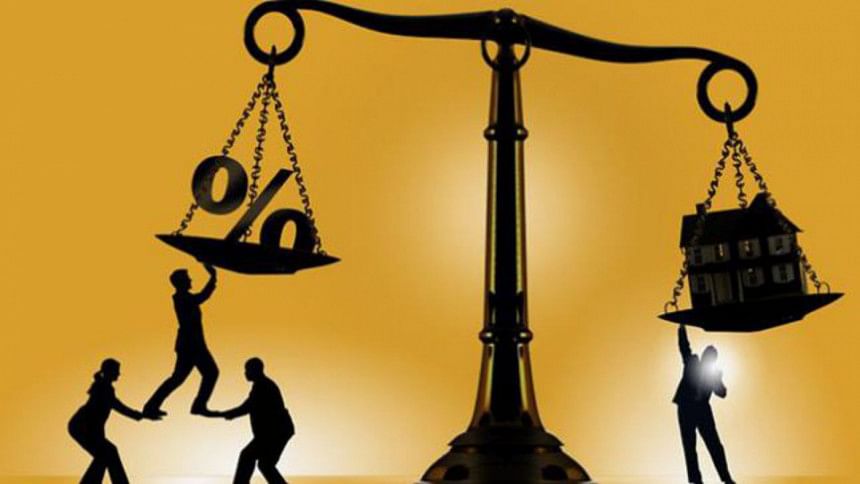Curbing Loan Default: ‘Match-fixing’ in govt measures

The government seems to lack the will to arrest bad loans and restore corporate governance in the banking sector with the habitual defaulters working the system, analysts said.
A good number of delinquent borrowers, many of whom became lawmakers last year, avoided the defaulter label by taking advantage of relaxed rescheduling facilities and filing writ petitions with the High Court, they said at a roundtable discussion to find ways to fix the banking sector.
Sushashoner Jonno Nagorik (Sujon), a civil society platform, orgainsed the discussion at the Jatiya Press Club Auditorium yesterday.
Moinul Islam, former professor of economics at Chittagong University, presented the keynote paper on how to fix the banking sector.
According to the International Monetary Fund, the amount of defaulted loans, as of June, is Tk 240,167 crore, The Daily Star reported recently, he said.
If the written-off loans were added, the amount might be closer to Tk 300,000 crore, he said.
“But the government is trying to conceal the real picture ... .”
The central bank has recently eased policies for loan classification and rescheduling to artificially bring down the defaulted loan figures, he said.
“The government apparently says it has taken different measures to arrest default loans, but there has been match-fixing. More than 60 percent of the lawmakers are from the business community and the majority of them are habitual loan defaulters.”
They use their political influence for not paying back their loans. They regularise their defaulted loans frequently, file writ petitions with the High Court, and use relaxed rescheduling facilities of the central bank, he said.
“Besides, one of the top habitual defaulters in the country is now holding an important position in the prime minister’s inner circle.”
Key people of a company should be brought to book if their defaulted loans stay in the bad-loan category for a year. Besides, passports of habitual defaulters should be confiscated and the list of top 10 defaulters of every bank branch should be hung in front of their offices, said Moinul, also a former president of the Bangladesh Economic Association.
The total number of banks is now 60 and three more in the pipeline. “This is excessive given the volume of the economy.”
Individuals with strong links to the ruling party have managed to obtain licences to open new banks in recent times, Moinul said.
He went on to cite the case of a Chattogram-based business tycoon who has ownership of seven private banks to substantiate his point of poor-discipline in the banking sector. “Such an example cannot be found anywhere in the world.”
There were allegations that the businesspeople were siphoning off money from banks using fake names, Moinul added.
“The banking sector has become the ‘casino’ for the financial sector,” said Khondker Ibrahim Khaled, a former deputy governor of the Bangladesh Bank.
Stealing money from the banking sector could be stopped only if the government had a strong will, he said. But how can that be possible if the country’s top habitual defaulter and a stock market scamster secures an important position in the government?
If anyone raises voice against the irregularities, he or she has to face difficulties due to the “absence of democracy in the country since 2018”, Khaled said.
Political influence was the main reason behind the worsening of the defaulted-loan situation in Bangladesh, said Syed Abu Naser Bakhtiar Ahmed, a former managing director of Agrani Bank.
The government was yet to take any action against BASIC Bank’s former chairman Sheikh Abdul Hye Bacchu despite his involvement in siphoning off about Tk 4,000 crore from the state-owned bank.
Some Tk 10,000 crore was looted from Janata Bank by only two to three people, but no exemplary punishment was handed down.
“Such impunity encourages the vested quarters not to pay back money to banks,” Abu Naser added.
Large sums were being laundered abroad, said Rashed Al Mahmud Titumir, professor of development studies at Dhaka University.
Against this backdrop, the country’s banking sector has failed to create fresh capital to make the economy vibrant, he added.
Badiul Alam Majumdar, secretary of Sujon, moderated the roundtable, while the organisation’s Chairman M Hafiz Uddin Khan presided over the event.
The others who spoke include Awami League leader Inam Ahmed Chowdhury, Gonoforum leader Abu Sayeed, and Communist Party leader Abdullah Al Kafi Ratan.

 For all latest news, follow The Daily Star's Google News channel.
For all latest news, follow The Daily Star's Google News channel. 








Comments